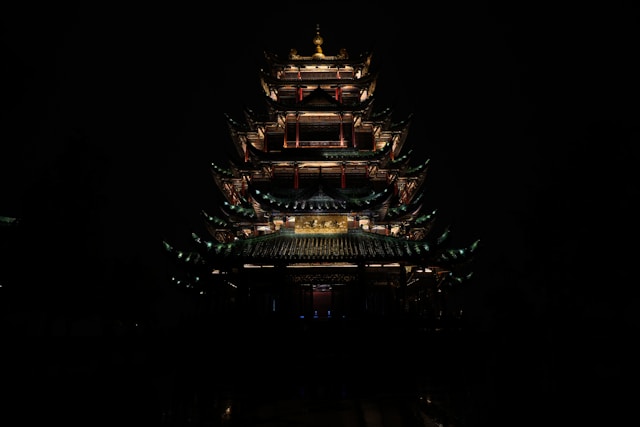Shrouded in mystery, Laozi (also written as Lao Tzu) stands as one of history’s most influential spiritual teachers, though surprisingly little is known about his life with certainty. Traditional accounts place him in the 6th century BCE as an archivist in the imperial library of the Zhou Dynasty. The legend tells that before disappearing into the western mountains, he wrote the Tao Te Ching at the request of a border guard. Whether this account is historical or mythological, the wisdom contained in the 81 brief chapters of the Tao Te Ching has profoundly influenced Chinese thought and culture for over two millennia.
The Ineffable Tao
At the heart of Laozi’s teaching lies the concept of Tao (or Dao), which paradoxically begins with the acknowledgment that it cannot be fully described. As the opening lines of the Tao Te Ching state:
The Tao that can be spoken is not the eternal Tao.
The name that can be named is not the eternal name.
This fundamental paradox sets the tone for Laozi’s entire teaching. The Tao, which might be understood as the source and substance of all existence, transcends our conceptual frameworks and linguistic capabilities. Yet Laozi provides numerous pointers to help us understand and align ourselves with this ultimate reality.
The Wisdom of Non-Action (Wu Wei)
Perhaps Laozi’s most distinctive teaching is the principle of wu wei, often translated as “non-action” or “effortless action.” This doesn’t mean passive inaction but rather acting in perfect harmony with the natural flow of life. He expresses this wisdom beautifully:
The supreme good is like water,
which nourishes all things without trying to.
It flows to low places that people disdain
and so is like the Tao.
This teaching suggests that true effectiveness comes not from forcing our will upon situations but from understanding their natural dynamics and working with them rather than against them. Like water, we should seek to flow around obstacles rather than confronting them directly.
The Power of Emptiness
Laozi frequently points to the importance of emptiness and space. He observes that it’s the empty space within a vessel that makes it useful, the empty space within a house that makes it livable. As he states:
We join spokes together in a wheel,
but it is the center hole
that makes the wagon move.
This principle extends beyond physical objects to the mind itself. A mind full of preconceptions and fixed ideas cannot receive new understanding. True wisdom requires maintaining an inner emptiness that allows for fresh perception and understanding.
Simplicity and Naturalness
Throughout the Tao Te Ching, Laozi advocates for returning to simplicity and naturalness. He sees humanity’s troubles as arising largely from moving away from our natural state through over-civilization, excessive desires, and complicated thinking. The solution lies not in adding more but in returning to basics:
I have just three things to teach:
simplicity, patience, compassion.
These three are your greatest treasures.
The Return to Original Nature
For Laozi, spiritual practice isn’t about becoming something different but about returning to our original nature. He sees the complications and corruptions of society as layers covering our natural wisdom and virtue. By letting go of artificial constructs and returning to simplicity, we naturally align with the Tao.
This return isn’t achieved through effort or striving but through a process of releasing and unlearning. It’s more about removing obstacles than adding achievements. This is why Laozi often speaks of reduction rather than accumulation:
In pursuit of knowledge, every day something is acquired.
In pursuit of wisdom, every day something is dropped.
The Balance of Opposites
Another key aspect of Laozi’s teaching is understanding the interplay of opposing forces. Rather than seeing opposites as conflicting, he presents them as complementary aspects of a greater whole. This is most famously represented in the concept of yin and yang, though Laozi applies this principle more broadly to all of life.
He teaches that:
- Strength arises from weakness
- Success contains the seeds of failure
- What is bent becomes straight
- What is empty becomes full
Understanding this natural alternation helps us maintain equilibrium in life’s ups and downs.

Practical Wisdom for Leadership
While deeply spiritual, Laozi’s teachings also offer practical wisdom for leadership and governance. He advocates for a subtle, minimal approach to leadership where the best ruler is one whose subjects barely know they are being governed. This principle can be applied to any position of authority or influence:
- Lead without controlling
- Serve without expecting recognition
- Accomplish without taking credit
- Guide without interfering
The Art of Living
At its heart, the Tao Te Ching is a guide to the art of living. It teaches us to:
Find strength in gentleness
Instead of trying to be strong and unyielding, we should cultivate the strength that comes from flexibility and adaptability.
Embrace simplicity
Rather than constantly seeking more, we should learn to find contentment in having less.
Practice non-interference
Allow situations and people to unfold naturally rather than always trying to control outcomes.
Cultivate wisdom through observation
Learn from the natural world rather than imposing our ideas upon it.
Modern Relevance
Laozi’s teachings hold particular relevance for our modern world:
- In an age of complexity, they remind us of the power of simplicity
- In a time of constant activity, they teach the value of stillness
- In a culture of achievement, they show the wisdom of non-striving
- In an era of environmental crisis, they offer a model of living in harmony with nature
The Way Forward
The path Laozi describes isn’t about reaching some distant goal but about returning to what we already are. It’s a journey of unlearning rather than learning, of releasing rather than acquiring. Through this process, we naturally align ourselves with the Tao, the underlying principle of all existence.
His message remains both simple and profound: by letting go of our complicated ideas and returning to our natural state, we find the peace and effectiveness that come from living in harmony with the Tao. In a world increasingly characterized by complexity and struggle, this ancient wisdom offers a refreshing alternative—a way of living that brings us back into harmony with ourselves, others, and the natural world.

